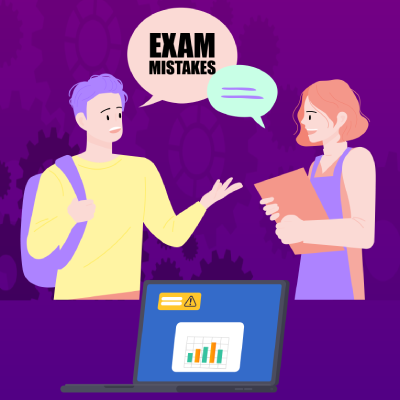Bounce Back from Poor Grades by Analyzing and Rectifying Your Mistakes in Economics Exam

A poor grade in an exam can mean you did not prepare well enough, did not fully understand the topics, or made some mistakes when taking the exam. A poor grade does not mean you are a poor student; it should be a wake-up call. You can bounce back from poor grades if you work hard to analyze and rectify your mistakes.
How do you go about analyzing your mistakes?
Use the economics exam you got a poor grade in to analyze the mistakes that contributed to it. This is important in forming an action plan to tackle said mistakes. There are various questions you can ask yourself which include:
- What mistakes did you make? Identify them. For example, did you fail because you ran out of time or confused some economics concepts, e.g., were you asked to define the law of supply and instead defined the law of demand? Did you make a silly mistake or forget a formula? Write down a reason for every question, which will help you know where to work in revision and exam strategies. This will help you find a tutor since you know what areas you need to focus on.
- What lessons can you learn from the mistakes? Use the recent exam to help you make an action plan on how to handle your next exam better. You can do this by asking yourself the following; how can I ensure that these mistakes do not repeat? Do you need to study more or practice mathematical problems more? Did you fail because you did not understand economics concepts well? In this case, do you need to get a tutor, form a group discussion, or research more? These lessons will be essential in bouncing back from your poor grade.

Types of Exam Mistakes that can contribute to poor grades
Knowing the type of error or mistake you made in the exam can help you create a strategy and an action plan to prevent the same from repeating. There are several types of mistakes you can make to get a poor grade on your exam. They include:
Careless mistakes are simple mistakes that can be caught automatically without much analysis. Examples of these mistakes include: misreading the question, simple mistakes like using addition where you should have subtracted in a math problem, skipping a question, and using the wrong spelling for an answer, among others. An example of these mistakes in an economics exam is, say you had a question asking you to illustrate the law of demand using a graph, a careless mistake on this would be you misreading the question and illustrating the law of supply instead. This is a careless mistake.

To avoid this mistake, assign enough time for each question in the exam to ensure that you spend enough time attempting it. Read the instructions in the exam carefully, as well as each question. This will help you avoid is-answering the question. When you are done answering the questions, take some time to review each question and answer to ensure you have answered what was required. For mathematical problems, go through them step by step to check for any careless errors you may have made. Careless mistakes are easy to spot and can be avoided by being more careful.
These are mistakes you make when you are aware of the economics concept in the question but cannot apply it to your answer. These mistakes will often occur with difficult questions that require the application of concepts. Especially when you have not studied enough to understand said concepts or you had just crammed without understanding, the application can become difficult. For example, you can get a question asking you to explain how some concepts of macroeconomics like inflation affect the business environment. This is an application question requiring more than knowing about macroeconomics. If you had simply crammed the basics, you might not know how to answer this question correctly.
To rectify this mistake, ensure that you read to understand every concept taught in class. Where needed, do some additional research to help understand how various concepts can be applied to business. The main objective of learning economics is knowing how to apply the concepts to the business environment. You can get a study group to help explain the point better and explore the questions arising from the topics. Learn how to predict how various concepts can be twisted into application questions in the exam by thoroughly studying them. That way, you can practice answering while having a point of reference which will help you know how to answer application questions in the exam.
Also known as mastery mistakes, you do not understand the concepts taught. They are also mistakes that arise when you do not provide enough explanation or detail in your answer to the exam question. For example, you get a question worth 6 marks asking you to differentiate between microeconomics and macroeconomics. If you give just the definition and do not include 2-3 supporting points, this will not be enough to get the full 6 marks in the question which can result in a poor grade. Also, if you interchange the definitions because you did not fully understand the concepts in class, that is a concept error.
Once you have identified this mistake, the best way to rectify it is to ensure that you are reading to understand and not cram. Ensure that you have understood the concepts taught in detail and can explain them well. You can take some practice tests to ensure you know how to answer exam questions in depth and get the total marks. With an exam in which you already have a poor grade, go back to the questions you failed due to a lack of concept and test yourself on those topics to see how well you understand them. Learn economic principles and, where needed, seek the help of your instructor to help you understand them better.
These mistakes can also be classified as prioritization errors. This does not mean that you did not study. It means you chose what material was most likely to be tested in the exam and studied that. Then the exam tested something completely different that you did not study. For example, studying only unemployment and inflation since it’s the topics you are at at the time of the economics course and ignoring the first topic of consumer demand since it was taught a while back. If the exam tests on the first topic you ignored, you will most likely fail. It can also be that you did not spend enough time studying the said material.
To rectify this mistake, ensure that as you begin studying, go through the course outline to identify critical areas of study. Do not ignore some topics and deem them to be unimportant. Treat every topic as one probable of being in the exam. There are some areas of economics that you cannot miss in every exam, which you can identify by reviewing old exams where you can get some. This does not mean that you ignore others. Study your class notes and textbooks, do some extra reading, and, where possible, have study groups to better your understanding of concepts.
These are mistakes made as a result of how you take the tests. You may have studied well and understood the concepts and their application but how you do your exam makes you fail. This includes omission mistakes, where you miss some questions or fail to complete a math problem to the last step. You could also spend too much time on one problem you are stuck on or change your answer from correct to incorrect due to doubt. Another exam-taking mistake can be miscopying an answer to your answer sheet from your scratch work. This is especially true for math problems where you first do some scratch work to ensure you are sure of your answer before writing your final answer.
To avoid these mistakes, ensure that you leave some time to go through your test to avoid omission mistakes. Ensure you have at least answered every problem and that your math problems are completed to the final step. When you encounter a complex problem, skip it, tackle the easier ones, and return to the difficult ones later. Ensure that you do not change your answers on the exam unless you have double-checked them and are sure that what you have changed is the correct answer. When copying answers from your scratch work, ensure that you compare it to the final answer of your exam to ensure that you have copied it correctly.
Rectify your mistakes and work towards a higher grade
For each problem you failed in your exam, classify the type of mistake you made to know what you need to work on. Working on rectifying your mistakes can help you work towards getting a higher grade in your next exam and avoid getting poor grades in the future.